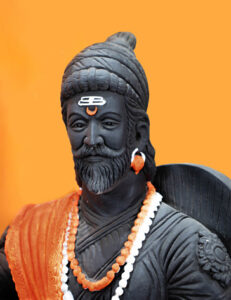Chattrapati Shivaji
From 1674 to 1680, the legendary Maratha king Shivaji Bhosale—also known as Chhatrapati Shivaji Maharaj—ruled over portions of what is now Maharashtra and Karnataka in India. He is regarded as one of the greatest warriors in Indian history and is widely regarded as a symbol of Maratha pride.
Early Life
Shivaji was born on February 19, 1630, to Jijabai, a devoted Hindu woman, and Shahaji Bhosale, a Maratha nobleman, in the hill fort of Shivneri, close to Pune in Maharashtra. Shivaji received early training in military and leadership skills from his mother and other professionals. He was greatly influenced by the tales of Hindu mythological heroes like Ram and Krishna and was especially interested in the art of warfare.
Rise to Power
Beginning his career as a warrior in the early 1640s, Shivaji launched several guerrilla attacks against the Deccan plateau’s Mughal emperors. He quickly established a reputation for being a fearless and cunning warrior and was successful in taking over several forts and territories in the area. He proclaimed himself the ruler of the Maratha empire in 1674 and received the title of Chhatrapati, or “supreme sovereign.”
Military Strategy
Shivaji’s military tactics were innovative and ahead of his time. He developed a powerful navy and was known for his use of guerrilla warfare, hit-and-run tactics, and lightning raids. He also introduced a system of fortification that made it difficult for enemy forces to capture his territories. His guerrilla tactics and forts became a model for future Indian military leaders.
Administration
Shivaji was a skilled soldier, but he was also a skilled administrator. He enacted several reforms in his kingdom, one of which was a taxation scheme based on his subjects’ agricultural output. Additionally, he promoted the arts and literature while encouraging the use of the Marathi language.
Legacy
India still feels the effects of Shivaji’s legacy. He is revered as a national hero and a representation of the fight against foreign occupation. Millions of people in India are still motivated by his beliefs in self-rule, nationalism, and social justice. Numerous books, plays, and movies have been made about his life, including the current box office sensation “Tanaji: The Unsung Warrior.”

Shivaji’s life and legacy serve as an example of the strength of will and vision. He had to overcome great obstacles to establish a powerful, independent kingdom that had a lasting effect on Indian history. Generations of Indians have been inspired by his bravery, military brilliance, and leadership abilities. The life of Shivaji serves as a reminder that true greatness is a product of one’s character and convictions, not of one’s birth or status. Around April 3, 1680, the eve of Hanuman Jayanti, Shivaji passed away at the age of 50. There is disagreement over Shivaji’s death’s cause. According to British records, Shivaji passed away after suffering from bloody flu for 12 days.
